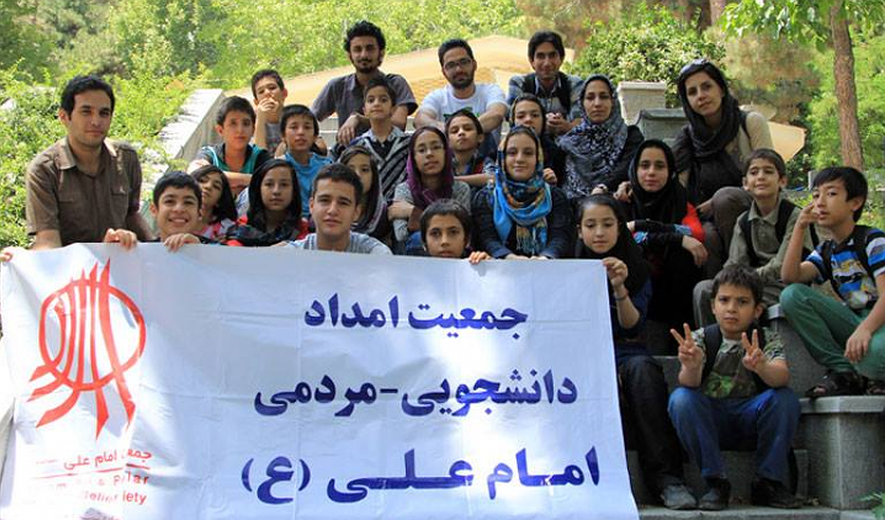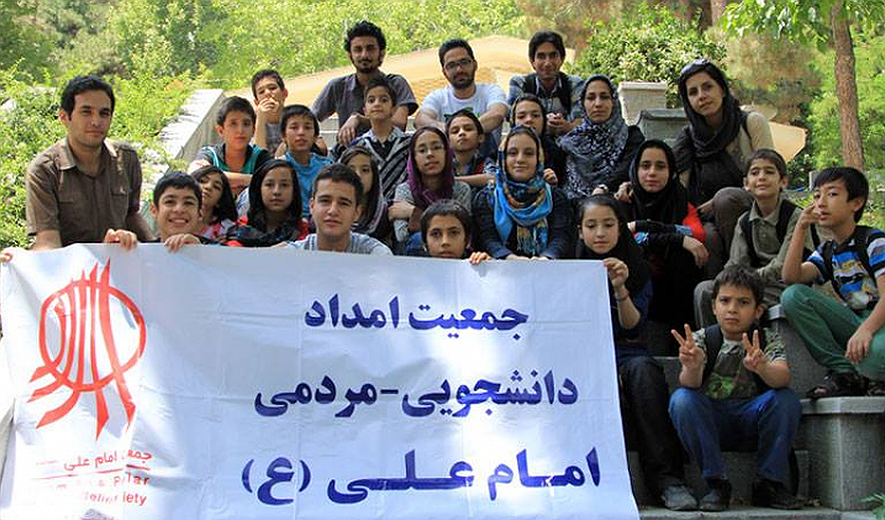Imam Ali Society Dissolution Ruling; Mounting Crackdown on NGO Activists

Iran Human Rights (IHRNGO); June 3, 2022: Branch 28 of the Tehran Appeals Court has upheld the ruling to dissolve the Imam Ali Popular Student Relief Society, one of the most renowned NGOS in Iran and the pressure on its board of directors continues.
The Imam Ali Popular Student Relief Society (IAPSRS), is an NGO established in 1999, working on issues including poverty, education, healthcare and employment. One of the most crucial areas of their work was supporting youth affected by crime, especially juvenile offenders on death row. The organisation has managed to save over 50 teenagers from execution through mediation with the victims’ families.
According to information obtained by Iran Human Rights, Branch 28 of the Tehran Appeals Court has upheld the ruling to dissolve IASPSRS, a motion which was brought against them by the Ministry of Interior on 3 March 2021.
An informed source who wished to remain anonymous, spoke to Iran Human Rights about the ramifications of the ruling: “With the closure of the Society, more than six thousand children and their families have been deprived of the help they were receiving from the Society. They’ve also closed all the organisation’s offices.”
According to the source, state media including Kayhan newspaper announced in the days following the ruling that “(security forces) should not be allowing the Imam Ali Society founders and board of directors to continue their activities, even by establishing another charity.”
On 25 May, Kayhan’s front page called the NGO’s board of directors “law breakers” and wrote: “Given that those operating this organisation have a history of misconduct, it seems necessary for monitoring agencies to closely monitor their activities, whether that’s with other names or within other organisations, and prevent them from committing further unlawful acts.”
According to the judgement by the Tehran Court of Appeals, the ruling makes it illegal for the founding members and board of directors to conduct any activities under the Imam Ali Society name or cooperate with any governmental and non-governmental organisations.
The dissolution ruling comes while more than 5,000 member volunteers are working with the charitable organisation across Iran. On 21 February 2021, they announced that the Ministry of Interior had given the Imam Ali Society until 12 March to dissolve the organisation. A Ministry of Interior motion for its dissolution was granted by Branch 55 of the Shahid Beheshti Judicial Complex in Tehran on 3 March, nine days before the deadline. Another case was also opened against them by Branch Two of Tehran’s 33rd District Court.
The process of authorising and approving the ruling to dissolve the Imam Ali Society has been unfair from the start. Arash Keykhosravi, one of the organisation’s lawyers had previously stated that following the preliminary ruling, he had gone to the court to submit evidence where he was informed that the ruling had already been made “less than 12 hours after the preliminary verdict was issued.”
Another of the Society’s lawyers, Abuzar Nasrollahi said: “Despite the fact that a large percentage of the required documentation were submitted to the judge during the hearing, there is a very long verdict which includes the Ministry of Interior’s request with all its typos.”
According to the lawyer, the court did not even request to visit the organisation’s local offices and see their activities to investigate the charges.
On 22 June 2020, the NGO issued a statement that read: “At 4pm yesterday (21 June), two groups of judicial officers, with a warrant filed by the IRGC Sarallah forces headquarters, simultaneously entered the homes of Mr Sharmin Meymandinejad (the Society’s founder) and Mr Morteza Keymanesh and Ms Katayoun Afrazeh.”
In the warrant, Sharmin Meymandinejad was charged with insulting the Supreme Leader, the founder of the Islamic Republic, and Morteza Keymanesh and Katayoun Afrazeh were charged with acting against national security. Morteza and Katayoun were released on bail a month later.
On 17 August 2021, the Ministry of Interior set a 20-day deadline for the NGO to change its structure. Following the expiration of the deadline, Zahra Rahimi, the organisation’s managing director and Sharmin’s wife, was arrested on 6 September and released the next day. Sharmin himself was released on a bail of 2 billion tomans on 27 October 2021.
According to the NGO’s lawyers, the judge in the case ignored the principle of “separate legal personality” and charged the entire organisation with the accusation brought against one of its members.
At the time of Sharmin’s arrest, the IRGC affliated Fars news agency wrote: “This person has collaborated with anti-Iranian centres under the guise of charitable work. According to the obtained information, as well as blasphemy and promoting deviant anti-religious beliefs, they have collaborated with dissident and foreign media.”
Pressure on NGOs intensified since Riasi took power
Speaking to Iran Human Rights about the pressure on NGOs in the last two years and since Ebrahim Raisi took office as president, an informed said: “Since 2019 specifically, a working group called the ‘Eradicating Deprivation’ was formed led by Ali Agha Mohammadi, the Islamic Republic leader Ali Khamenei’s economic advisor, which has set up in different Tehran neighbourhoods including Darvazeh Ghar, with huge budgets and resources. While working, they also try to prevent NGO’s working there.” Darvazeh Ghar is one of the most povery stricken neighbourhoods of Tehran.
According to the source, such bases have been formed with the help of security agencies including the Ministry of Intelligence and their purpose is the prevent civil activists from working in the social care sector.
The informed source believes that the pressure on NGOs intensified after the appointment of Alireza Zakani as Tehran mayor: “For example, the (Tehran) City Hall organises meetings called “People Visits” in Darvezeh Ghar. At every meeting, government-affiliated individuals who claim to be residents turn up and state that they want NGOs to leave their neighbourhood.”
Members of the Tehran City Council are also working with the Tehran City Hall and security agencies to push this agenda.
The Imam Ali Society is not the only NGO to have been targeted by the authorities in the last two years. According to informed sources, “Khaneh Khorshid” (Sun House) and the Society for the Protection of Children’s Rights are two other NGOs under government pressure.
Furthermore, according to information obtained by Iran Human Rights, the State Welfare Organisation of Iran has declared new rules in recent months that require charities and NGOs working in the social care sector to provide the national ID number of every individual they help. Immigrants and unidentified individuals who do not have national ID numbers can therefore no longer receive help from charities and NGOs.
Obtaining an NGO licence in Iran
“In order to obtain a licence, the founding members must submit their personal documents to the NGO Supervisory Board at the Ministry of Interior. The Ministry of Interior then investigates their history in collaboration with the Judiciary, police and Ministry of Intelligence. Also, since Hassan Rouhani took office, a government institution called the ‘Specialised System’ must also opine in order for the licence to be issued,” informed sources told Iran Human Rights.
If any of the abovementioned institutions express a negative opinion about even one of the founding members, “the request to establish that NGO will be rejected.”
After receiving feedback from the Judiciary, the police, the Ministry of Intelligence and the Specialised System, the NGO must then register as a company so the government can have oversight on their financial and tax affairs.
According to the sources, the process to obtain a government licence can take several months or several years.


